
Whether outside in the park, together with a picnic, or on the balcony with iced coffee: The summer is currently once again inviting you to plant yourself outside with the right book and read in the best weather. With this in mind, we have come together for 55BirchStreet's five-year anniversary and put together a very special reading list! We usually curate only 5 books per list, but this time so many Birchies presented their must reads for summer 2023, which is why we can guarantee: There is something for everyone here 😉 We hope you enjoy reading!
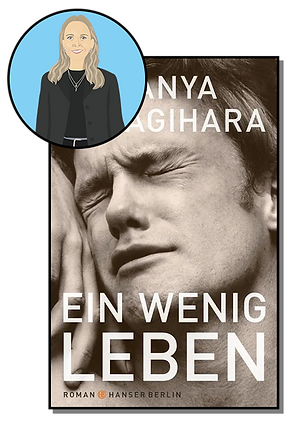
Maike recommends: “A little life” should definitely not be missing for me this summer, simply because it is a wonderful book about friendships and the ups and downs of life. But before reading, maybe look up the trigger warnings!
“A Little Life” is about the lifelong friendship between four men in New York who met at college. Jude St. Francis, brilliant and enigmatic, is the charismatic figure at the center of the group — a self-sacrificing loving yet internally broken person. The friends are drawn ever deeper into Jude's dark, painful world, whose monsters are gradually emerging.
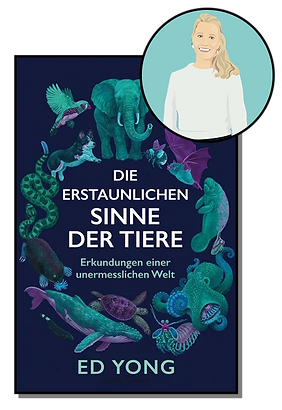
Lena recommends: A book that gives an amazing insight into the diversity of our world!
Every species on Earth only senses certain stimuli from their respective environment: which, how and why exactly, that holds amazing discoveries. Science journalist Ed Yong takes us on an amazing journey to the senses of animals. Only when we know what they see and how they experience the world can we protect what is about to be lost. We encounter beetles that are attracted to fire, turtles that can detect the earth's magnetic fields, fish that fill rivers with electrical messages. We learn that the scales on a crocodile's face are as sensitive to touch as the fingertips of a person in love; that the giant squid with its football-sized eyes can recognize its enemy, the sperm whale; why leaves vibrate in sync with the rhythm of the inaudible songs of courting humpback cicadas and what a complex sense of sight scallops have. We discover what bees see in flowers, what songbirds hear in their melodies. But by disrupting the animals' senses through light pollution, noise and other sensory surges, humans endanger biodiversity and the wealth of nature.
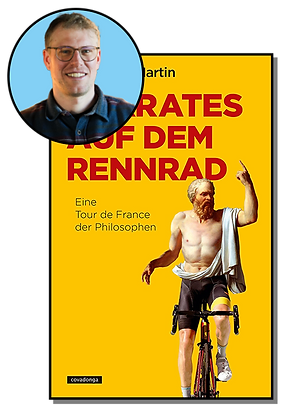
Hannes recommends: Entertainingly written by a former Tour de France rider who combines philosophy with racing cycling and sport in general. Easy, fuzzy — and yet very educational.
With his first book, Guillaume Martin has succeeded in creating an equally clever and entertaining book that combines profound thoughts and exciting sports stories and thus appeals to a large audience: Anyone who is particularly interested in sports and reflected insights into professional careers also learns the basic features of important ideas and theories almost imperceptibly. Philosophically savvy readers, on the other hand, are pleased with the recognizable traits of the scholars in the racing saddle. And in the end, it's clear to everyone that top physical performance doesn't have to be in conflict with intellectual ambitions. Because even and especially in (cycling) sport, the guiding principle once formulated by Henri Bergson, the French philosopher and Nobel Prize winner in literature: “You must act like a thinking person and think like an acting person. ”
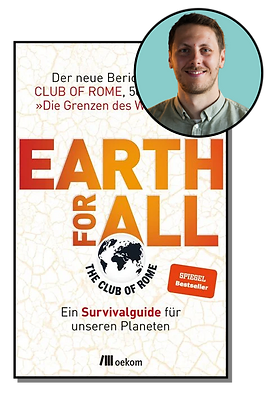
Timm recommends: Summer is getting hot and it's good to know why that is actually the case. The second Club of Rome book — everyone should have read it!
In 1972, a book shook the world's belief in progress: “The Limits to Growth.” Since then, the first report to the Club of Rome has been considered the most influential publication on the impending congestion of our planet. To mark the 50th anniversary, renowned scientists such as Jørgen Randers, Sandrine Dixson-Declève and Johan Rockström are once again looking to the future — and presenting a recovery program for our crisis-ridden world.

Johanna recommends: I brought a book from my child! Hey, “Feelings — That's how I feel!” It can't hurt you in everyday working life, right?
Sometimes you're really happy, sometimes you're not doing so well. Does everyone actually feel that way? And what are feelings anyway? This book vividly provides an understanding of one's own emotions and those of others. It explains body language and promotes the development of self-esteem and empathy.
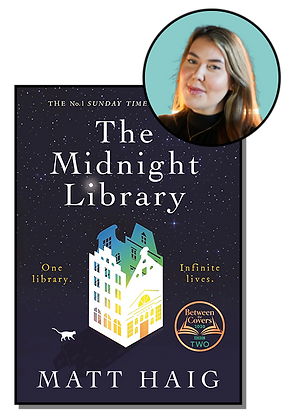
Celina recommends: Each of us is faced with difficult decisions without knowing where we want to go. The book helps with that.
Imagine that on your way to the afterlife, there was a huge library filled with all the lives you could have led. Anything you've ever regretted, you could undo. That is exactly where Nora Seed finds herself after she has decided to commit suicide out of sheer despair. In this place between space and time, where the clock hands are always at midnight, she suddenly has the opportunity to change everything that has thrown her off track. But can you be happy in another life if you know that it isn't your own? Matt Haig's enchanting novel tells of the fact that decisions we later regret make us the people we are. “The Midnight Library” is a declaration of love to all our peculiarities and peculiarities, to the only life we have.
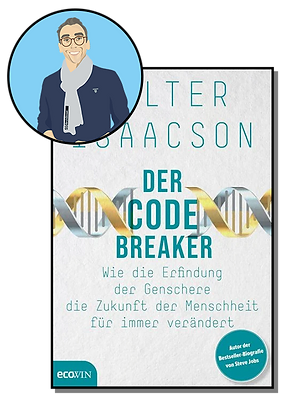
Martin recommends: A book about biotechnologies, in particular gene scissors, and how such innovations can further influence humanity. Very fascinating!
What does nature do when a new enemy appears? She finds a new strategy. When a bacteria is attacked by a virus, it defends itself, for example, by changing its genetic structure. But how can these mechanisms be proven? And what use does this knowledge have for medicine? The American Jennifer Doudna and the Frenchwoman Emmanuelle Charpentier have achieved groundbreaking findings in the field of biochemistry: The two researchers were able to discover and reproduce nature's defense strategies at the most fundamental level, that of the cell. The result is called “CRISPR.” These gene scissors can precisely change the genetic blueprint.

Anne recommends: It's a bit heavy food, but it's still super important! Highly recommended for a more empathic relationship with each other.
When a loved one dies, one's life suddenly seems to come to a standstill. The time after that is difficult, and yet we are giving less and less space to grief and feel compelled to return to everyday life quickly. Psychotherapist and grief counselor Megan Devine is experiencing this herself after the tragic loss of her husband. That is why she is looking for a new and healing way to deal with grief. Based on numerous experience reports, she sensitively describes how important grief is for our mental health and how we can learn to deal mindfully with ourselves and the feeling of loss in order to finally find inner peace and move on in love with the deceased.
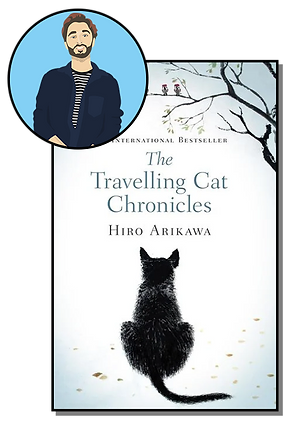
Toni recommends: A book about traveling with animals, interpersonal relationships that you have lost over time and how they find themselves again. A very, very nice story and I'm really excited if more people can read it!
Satoru and his old cat Nana set off. On their journey across Japan, they visit all the people who have accompanied Satoru on his life so far, shaped and shaped him, loved and respected him, but also envied and critically viewed Satoru. But in the end, everyone makes peace: with their friend and companion Satoru as well as with themselves. And Nana? Look at everything from his own cat's eye view. He looks at people's innermost depths, down to the deepest depths of their souls. But what Nana doesn't know is that it will be Satoru's last journey.

Lisa recommends: A book about the social relevance of time and the fact that it is not made available to everyone equally in the context of social justice.
Social justice means an equitable distribution of time. Time is the central resource of our society. But it is not equally available to everyone. Teresa Bücker, one of the most influential journalists in Germany, makes concrete suggestions as to what a new time culture could look like that ensures greater justice, quality of life and social cohesion.

Hanna recommends: A successful attempt at conciliation to exchange perspectives on what makes the “old white men” really tick.
Sophie Paßmann is a feminist and completely disagrees with the platitude that the old white man is to blame for everything. She wants to know what is behind this cliché image and asks: When do you become an old white man? And is it perhaps possible to prevent becoming one? Sophie Paßmann is part of a new generation of young feminists; these are women who are proud, loud and self-determined. They want to become CEOs or housewives, have children or have careers, or both. And they have an enemy image, the old white man. It was never clarified exactly what the old white man was. One thing is clear: He has power and he certainly doesn't want to lose that power. But Sophie Paßmann wants certainty instead of cheap punchlines, so she meets powerful men to talk to them about it: “Are you an old white man and if so — why? “The resulting lyrics are among the smartest and at the same time funniest that you can find in this country.

Janine recommends: A great book about how positive thoughts can make an extraordinary life possible!
The Spiegel no 1 bestseller by Laura Seiler is a spiritual success guide for a fulfilling life: We all want to live a meaningful life that not only serves ourselves but also others. Far too often, however, limiting beliefs and lack of self-confidence prevent us from following our own authentic path. We're afraid of what others might think or maybe not be good enough. “Nice that you exist” encourages you to create an extraordinary life and to allow yourself to believe in yourself and your own creative power again. It is a powerful spiritual success guide that reminds us that we ourselves are the creators of our success and shows a way to live our own definition of success.
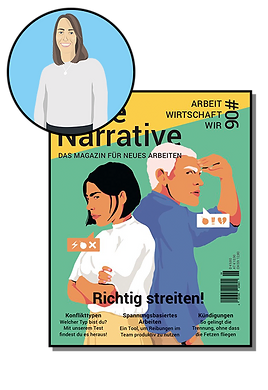
Fanny recommends: Just a great magazine, which is organized with topics related to the new world of work and economy.
“Neue Narrative is the magazine for new work. With stories and tools that empower you to shape a desirable future of work. We tell stories from a new, ego-free working world. With suggestions for tackling, imitating and thinking ahead.
By the way, you can find a quick overview of our recommendations in this video. 😉👇 Have fun browsing — enjoy the nice weather!
Do you have a question or would you like to find out how we can work together?
Feel free to contact us here or via linkedin with us — we'd love to hear from you